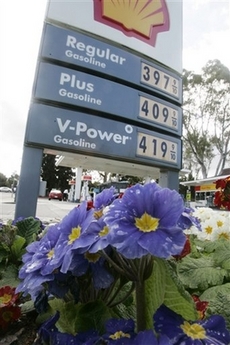Sales, dollar plunge; oil soars in US
Updated: 2008-03-14 07:42
WASHINGTON - Oil hit a record high, the dollar sank again, and consumers stopped buying pretty much everything.
 High gas prices posted at a Shell gas station in Menlo Park, Calif., Thursday, March 13, 2008. Gas and oil prices jumped again to new highs Thursday as the dollar weakened, although crude's advanced limited by fresh evidence of a US economic slowdown. [Agencies] |
Stocks kept gyrating, too, on Thursday, swinging between gloomy recession evidence and rising hopes that all the bad news would bring another aggressive cut in interest rates when the Federal Reserve meets next week.
The Bush administration, conceding the economy was facing "difficult" times now, rushed out new proposals aimed at next time — plans to fix various problems that have led to a severe crisis in credit markets.
Administration officials predicted an economic rebound once the impact of the Fed's credit cuts and the recently passed economic stimulus package begin to be felt.
Private analysts were not as confident, worrying that the economy is being hit by multiple blows and noting that some of the problems, such as plunging home sales and mortgage defaults, are showing no signs of abating.
"We're in the belly of the recession beast right now and all we really can do is take defensive action," said Bernard Baumohl, managing director of the Economic Outlook Group.
The Commerce Department reported that consumers, battered by falling home values, job losses, soaring energy costs and a severe credit squeeze, stopped going to the malls in February, triggering a 0.6 percent drop in retail sales.
That was the second big drop in retail sales in the past three months, a pattern consistent with the onset of a recession. Sales were down across a broad swath of the economy, from autos and furniture to appliances.
|
Related readings: |
At the White House, deputy press secretary Tony Fratto said the Bush administration expected a "difficult and challenging" period. But he also said Americans should have confidence in the long-term future of the economy because of the positive impact of the Fed's rate cuts and the economic stimulus package that will send rebate checks to 130 million households starting in May.
Bush is headed to New York on Friday to deliver a speech on the economy.
"I think it's important for the president to get out and talk about how he sees the economy, and why he sees the economy improving as the year goes on," Fratto said. But he conceded that surging energy prices were acting as a drag and "higher oil prices and higher gasoline prices are not going to go away overnight."
Indeed, both crude oil and gasoline prices hit all-time highs on Thursday with crude closing at $110.33 per barrel on the New York Mercantile Exchange. Gasoline prices jumped 2.1 cents a gallon overnight to a national average of $3.267 a gallon, according to AAA and the Oil Price Information Service. Analysts forecast that gasoline prices will keep climbing.
The dollar, meanwhile, dropped anew as global investors worried about the length and severity of any US downturn. The dollar dipped briefly below 100 yen for the first time in 12 years and fell to a new low against the euro.
On Wall Street, stocks slid but then rebounded somewhat as traders grew hopeful about a Fed rate cut next Tuesday of one-half point to as much as three-fourths of a point. Investors' moods were also bolstered after Standard & Poor's predicted that financial companies are nearing the end of the massive write-downs in the value of subprime mortgages and other assets.
The rating agency estimated that writedowns of subprime asset-backed securities could reach $285 billion globally, up from a previous projection of $265 billion. However, it said that "the end of write-downs is now in sight for large financial institutions."
The worst of the US slowdown has been the housing sector, which has been in a two-year slump that has seen sales and prices plunge in many formerly hot real estate markets. Those declines have shaken consumer confidence and triggered rising mortgage defaults. Homeowners could no longer count on rising prices to build equity in their homes that would allow them to refinance into more affordable loans.
The president's Working Group on Financial Markets, led by Treasury Secretary Henry Paulson, put forward a broad blueprint of changes on Thursday. The proposals were aimed at correcting a variety of abuses from mortgage brokers who pushed prospective buyers into loans they could not afford, Wall Street investment firms that aggressively packaged the mortgages in securities, and credit rating agencies that failed to assess the risks those securities carried.
While the recommendations could help prevent a repeat of the current crisis, critics said the administration still needed to go much further to stave off an expected tidal wave of foreclosures in coming months.
Nearly 60 percent more US homes faced foreclosure in February than in the same month a year ago, according to a report Thursday from California-based RealtyTrac Inc. Nevada, California and Florida registered the highest foreclosure rates.
|
||
|
|
|
||
|
||
|
|
|
|
